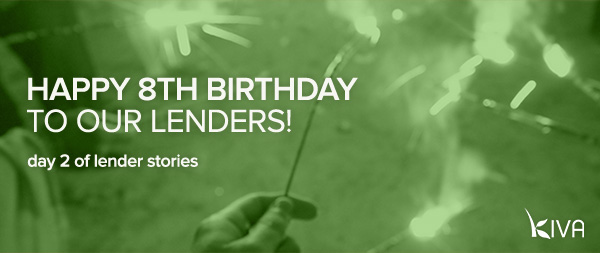
Eight years ago, Kiva was founded in October 2005, and ever since, we’ve considered October to be the organization's birthday. This year, we want to take the opportunity to celebrate the connections our lenders are making with borrowers around the world. So we asked our community one simple question: “What made you connect with a borrower on Kiva?” We received an amazing number of responses filled with truly heartwarming and inspiring stories.
 Matthias Kiva lender | I read about Kiva in a Danish newspaper while staying in Denmark for a month in July 2007; loved the idea of personal microfinance and opened an account. For a little over a year, I put $100 a month in my PayPal account and then lent it to Kiva borrowers. The Icelandic financial deep-freeze in October 2008 put a stop to that, but I kept on relending, each time giving a small share to Kiva, and will continue to do so until the last cent is gone. I started out slowly with a few loans, and in September 2007, I gave a loan to Samuel who was selling clothes in Kenya with his wife (and their three beautiful daughters). His repayments started coming in according to plan, but then in April 2008, they suddenly stopped. There had been riots and violence in Kenya in the wake of elections, with more than 1,000 people dead and up to 250,000 displaced, and Samuel had disappeared. I then realized that being a part of the Kiva lender team gave me the opportunity to witness the constantly evolving history of our planet in real time and that was a revelation; not only was I reading about what was happening, or watching news and documentaries from the different places of the world, I was involved in my own small way and the fate of complete strangers touched me directly. This is one of the most fascinating aspects of Kiva. As far as I know, Samuel from Kenya has never been heard of again, and his small family business is gone. His memory, however, still lives on in a distant part of the world, thanks to Kiva. |
 Shannon Kiva lender | My husband and I have been a part of the Kiva community since early 2008, so we've been along for a big portion of the ride! Kiva's 8th birthday and invitation to submit a loan story is a great opportunity to share why we focus a large portion of our lending to women in the Ukraine. Human trafficking is a global issue and is not limited to the boarders of the Ukraine or other Eastern European nations, so why this particular country? One of my great-grandmothers left the Ukraine in the early 20th century and somehow made it to Canada with a friend at the tender age of 17. She ended up in Winnipeg and then in Calgary working as a domestic for several wealthy families. We suspect she was likely brought here to work, and we have no idea if she had any say in the matter. Her departure from the Ukraine and the opportunity to stay in Canada has meant boundless opportunity for her descendents. |
PREVIOUS ARTICLE
New Field Partner: Sowing seeds for a brighter future in Somaliland with Kaaba! →NEXT ARTICLE
Durga Puja- West Bengal’s Biggest Festival →














